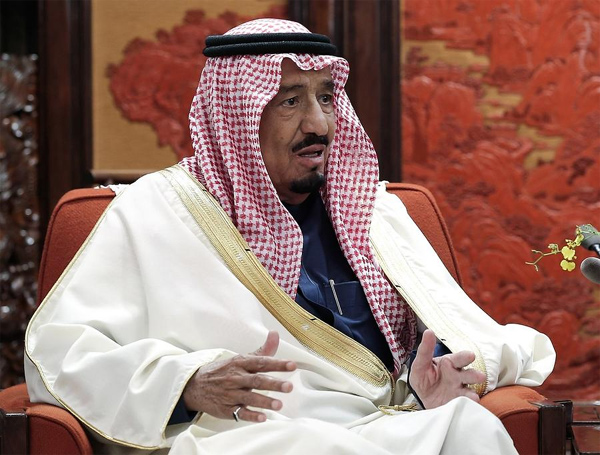Saudi King Abdullah dies, succeeded by half-brother
Updated: 2015-01-23 09:31
(Agencies)
|
|||||||||||
 |
|
Saudi Arabia's Crown Prince Salman bin Abdul Aziz al-Saud meets with Chinese Premier Li Keqiang at Ziguangge Pavilion in the Zhongnanhai leaders' compound in Beijing in this file photo from March 14, 2014. [Photo/Agencies] |
LONG TERM CHALLENGES
Abdullah pushed cautious changes in the Islamic kingdom including increased women's rights and economic deregulation.
King Salman has been part of the ruling clique of princes for decades and is thought likely to continue the main thrusts of Saudi strategic policy, including maintaining the alliance with the United States and working towards energy market stability.
During his five decades as Riyadh governor he was reputedly adept at managing the delicate balance of clerical, tribal and princely interests that determine Saudi policy, while maintaining good relations with the West.
In the long term Saudi rulers have to manage the needs of a rapidly growing population plagued by structural unemployment, and an economy that remains overly dependent on oil revenue and undermined by lavish subsidies.
Saudi Arabia, which holds more than a fifth of the world's crude oil, also exerts some influence over the world's 1.6 billion Muslims through its guardianship of Mecca and Medina, Islam's holiest sites.
Most senior members of the ruling al-Saud family are thought to favour similar positions on foreign and energy policy, but incoming kings have traditionally chosen to appoint new ministers to head top ministries like oil and finance.
In a country where the big ministries are dominated by royals, successive kings have kept the oil portfolio reserved for commoners and insisted on maintaining substantial spare output capacity to help reduce market volatility.
Related Stories
Saudi Arabia slows its $109 billion solar program 2015-01-22 13:43
Single women challenge tradition of love and marriage in Saudi Arabia 2015-01-22 07:36
Saudi Arabia: Driving ban easing possible 2014-11-09 08:02
Gunmen kill Shiite celebrants in Saudi Arabia 2014-11-05 07:59
Pilgrims arrive in Saudi Arabia 2014-09-24 17:17
Saudi's King Abdullah awarded new Lech Walesa prize 2009-02-10 15:27
Today's Top News
Greek leftist leader Tsipras claims victory
Favorable visa policy to draw talent
EU FMs to discuss Ukraine crisis
Expert: What Obama's India visit means to China
China to focus on reforms, opening of capital market
Li Ka-shing set to buy UK's O2
Saudi King Abdullah dies, succeeded by half-brother
Former Thai PM Yingluck banned from politics for five years
Hot Topics
Lunar probe , China growth forecasts, Emission rules get tougher, China seen through 'colored lens', International board,
Editor's Picks

|

|

|

|

|

|





